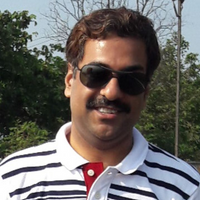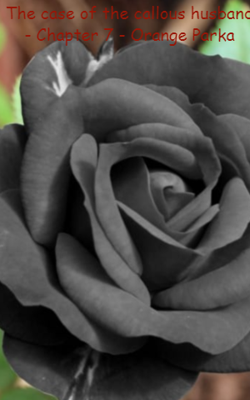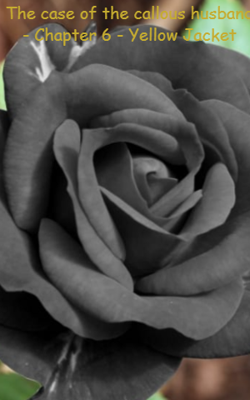A Woman's Dignity
A Woman's Dignity


“It must be cool down there?”
I said that with a smirk on my face, only because I was irritated. Honest. I’m not one to scoff at the poor and downtrodden. I feel for their plight, feel sympathy and all that. I’m not unkind.
She looked up startled.
“No,” she replied simply. “It’s hot here too.”
I’d asked the question in broken Hindi and she’d replied in English. I felt somewhat ashamed.
“Why’re you sitting on the floor?” I asked in English this time, slowly though, unsure if she really understood the language or the last time had been a fluke.
“I’m used to it,” she said. Then lowering her head, as if the conversation was over, at least from her side, she drew an indistinct shape on the floor.
We were the only two people in that corridor. She had looked up when I’d walked in. She had had to. My new heels were clapping like thunder on the freshly mopped floor.
She’d looked at me and smiled. A soft, benign smile. Our eyes had met. I’d missed a step. Or two.
They were remarkable eyes. In her small, oval face, everything was small and knew their place. Her eyes though were big. Sparkling and overpowering. Of endless depth. Eyes that had seen everything of this world, and thus sought something beyond.
Seated on the empty wooden bench next to her, I took a closer look. She was a frail young thing, probably in her late teens. Her face was dark, very dark, her skin luminescent, her hair oiled and pulled straight back into a tiny bun. She wore a neatly pinned yellow chiffon sari over a faded blouse, her bony arms sticking out from frayed sleeves. Ever so often, she dragged her fingers through the floor, making circles and squares, then leaned back as if to admire her masterpiece, brushing against the legs of my seat.
It was a warm, sweaty day. No air-conditioner or ventilation in the corridor running past the minister's office. I fanned myself vigorously with my notepad and grumbled about the heat, the traffic, the pesky guard outside who’d given me a lecherous once-over before waving me to pass inside. I talked to no one in particular, I think I merely thought all of these, but the girl next to me nodded and smiled.
Fifteen minutes passed. No word from the minister’s underlings. I had a story to file by afternoon.
“How much longer?” I complained to my nails.
“He’ll be busy until noon signing papers and talking on the phone,” the girl at my feet murmured. “September is a busy month for them.”
“How do you know?” I asked imperiously. “Do you work here?”
“No.” Her voice was low as she leaned forward to draw a large circle. “But I’ve come here many times.”
Deadline. Deadline. Deadline. I glanced at my watch. Another half an hour and I would either march into his room or march out to find another story.
I glanced at my watch. Jiggled my leg.
“He will call you soon,” she reassured me.
“What’s your name?” I asked, softening my voice, intending to be as kind to her as she was being to me. Also, to while away time.
“Jwala,” she replied.
“That’s a funny name.” I giggled.
She grinned back. “It means fire,” she said. “I named myself.”
“Why?” I asked. “What did your parents name you? Didn’t you like that name?” I knew that many of the Indian poor had no families and no homes, their parents died early from diseases or something. Maybe she was one of those unfortunate ones. Maybe she was the minister’s secret mistress! Now THAT would be a story.
“My mother’s alive. My father’s dead,” she replied, cutting into my train of fantasies. Then in hesitant English, each word spoken with care, she added, “I changed my name last year.”
“Oh,” I said, losing interest. “I see.” She must be a maid then. A learned maid. It wasn’t so uncommon these days.
We sat quietly for a while, each lost in our own thoughts.
I surveyed the fresh paint on the walls. This was a new building and only a few of the state assembly ministers had moved in to occupy their sprawling offices on the various floors. There were about five of them in the building that day, and the most important of them, the state minister for Law and Justice, sat in the room facing us. The minister was new, hurriedly appointed after his predecessor was sent to jail for bribery the month before. He had granted me ten minutes of his time for an interview after much cajoling and pandering.
I hadn't been to this new office yet. I imagined a plush cabin inside, the minister behind an expensive teak desk, under a photo of a softly smiling Mahatma Gandhi, layers of fawning peons and office staff between him and the door. Occasionally, some of them walked out.
One kind soul inquired if I wanted tea. I nodded. He forgot to ask Jwala. Luckily for her, my tea arrived in two paper cups.
“Have some.” I separated the cups carefully and tilted one to pour into the other.
“I am Dalit,” she whispered, her voice barely reaching me over the splash of hot tea. From one glass to another. “Untouchable.”
I stopped.
We learn the caste system when we are very young. Sometimes, they are in our school textbooks, sometimes apparent in everyday life. Mum had refused to hire a Dalit maid once and my grandmum refused to even be near one. I knew friends who wouldn’t play with Dalit kids or drink water from their homes.
But I am an open-minded, educated, modern Indian woman.
Or I am supposed to be that.
We never know how low we can go, or how high, until tested with the unexpected, a state of being that’s against our ingrained subconscious mores, our upbringing, our religion. Goes beyond theory.
I didn’t realize I was holding my breath (and two half-filled cups of hot tea in my hands) until Jwala said quickly, as if to save me from my discomfort, “Don’t worry. I’m used to it.”
“No.” I handed over a cup carefully. “What are you used to?” I muttered. My face was flushed. I was angry. At myself, for having hesitated.
She nodded to herself as if I’d passed a test. Smiling down at her cup, she took a long, leisurely sip.
“Thank you,” she said, this time in confident Hindi. “They ignore me always.” She pointed a finger towards the door to show whom she meant. “Always.”
“How many times have you come here?” I asked.
“I come every six months when my university holidays begin. I used to go to the old office before, with the old minister. Now this new one.”
“Huh, why?”
“I want them to reopen my case.”
“What case?” I asked.
“It’s not important.”
“Tell me.”
I was intrigued. What case was this fragile, teenage girl fighting alone, for which she had to come to the minister’s office every six months?
She shook her head. She didn’t want to talk about it.
“Come on, Jwala,” I said, “maybe I can help you.”
“No.”
“Please?”
In the end, she told me. In four clear sentences, like she was reading the news off a teleprompter.
Four clear sentences that shook my being.
Two years ago, I was raped by 8 upper caste Jat men in the village of Alwar which is my home.
The police registered a case only after my father killed himself.
Out of those eight, four were never arrested while the rest were acquitted.
And now, I only want justice.
Her words crashed into my ears. Shrill and jarring. Blood rushed to my face.
“What?” I managed to stutter. This wasn’t what I was expecting at all.
But it wasn’t that impossible, was it? I’d heard of it many a time. In my line of work, it’s regular news, a common statistic, something we hear about every now and then, feel sorry for the victim for about five minutes, shrug at the inevitability of it, and then move on with our daily lives.
Another Dalit girl raped and killed, publicly stripped and beaten, set on fire. What was new?
But here she was at my feet. One of them. A sweet, pretty, living girl.
Not a statistic.
We sat silently. I counted the tiles.
“What happened to you?” I asked, not sure what I meant to find out exactly.
“Now?” she didn't wait for me to confirm. “I’m studying in the city,” she continued with a hint of pride in her voice. “BA in History.”
“How…?” I bit my lip, not sure how to ask without sounding insensitive.
She responded, unperturbed. “I was lucky. My aunt took me in. I live in Jaipur now. I changed my name. No one knows about my history. I don’t have to worry until the case is reopened. If it is. Then my name will come out.”
“What do you want to do later?” I asked. “When you finish college?”
“Become a Teacher,” she replied promptly.
“Doesn’t pay very well,” I countered.
She turned her face up cheekily. “You can give me a job?” she asked.
“You don’t want that either.” We laughed together. Merrily. In sisterhood.
8 men raped her. Yet, she sat with me and talked.
And I couldn't get it out of my head.
After a pause, “They raped you,” I said, then heard the surprise in my own voice, as if I couldn’t believe it, that I was talking to someone who’d gone through it. “Why?” I asked, wondrously. Why do people do such heinous things?
“I came first in my tenth class. I always was a good student,” she said. “They were in my class and used to fail every year. They wanted to teach me a lesson. Dalits cannot do better than the upper cast.” She shrugged. “I used to think my father was joking when he asked me not to do well in class. When he asked me to be careful. But he was proud. He never said it, but I saw it every year I got home my report card. I couldn't fail. I couldn’t fail him.” She looked up at me. Those bright, beautiful eyes. Intense. All-knowing.
There were no tears in them.
“I forgot the pain,” she said softly. “But they had laughed. Those men… when they were on me. When I cried, they laughed.”
A lump formed in my throat, hard as a rock.
“I met policemen. I met ministers. I begged them to reopen my case. Punish them.” She gestured at the half-open door, “once or twice they gave me an audience.”
“Then?”
“It was always the same. Either kindly or rudely.”
“What?”
“They told me to forget everything. Not to fight upper caste men. To know my place. It’s tradition, they said. It’s our culture.” She paused. A hopeful smile lit her face. “But this new minister, I think he will listen. I think he is kind.”
“How do you know?”
“My aunt told me.”
“What if he doesn’t listen?” I asked.
“I’ll come again.”
“Until?”
“They stop laughing.” She shut her eyes tight, as if in pain, and rocked back and forth. Then after a few seconds, she opened them again and murmured, “they’re always laughing in my head.”
I crushed the cup and threw it into the bin. Jwala half rose to throw hers when the door opened and a lady in a brittle white sari announced that the minister was ready to meet me.
I gestured to the girl at my feet.
“Her?”
The lady dropped Jwala a look of disdain.
“That one keeps coming,” she said dismissively.
“She was here before me,” I said firmly.
“You coming or not?” the woman asked annoyed.
I rose quickly. Angrily. The woman took a hasty step back.
“Well?” she asked, unsure what I was up to, moving her eyes from me to Jwala and then to me again. Jwala was looking at me curiously too.
I stared back at her.
If not now, when? If not me, who?
I dropped to the floor next to her. Settled down cross-legged. Drew up my notepad.
The woman looked at me, baffled. Then with an exaggerated shrug, she left us alone, shutting the door of the minister’s office behind her with a bang.
Jwala turned to face me. I touched her hand and smiled. She didn’t draw away.
“Tell me your story,” I said. “Everything. Tell me everything.”
And she told me.























































